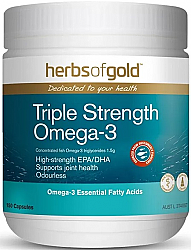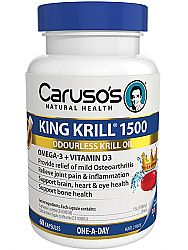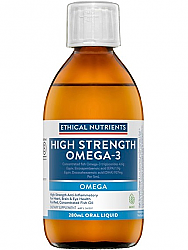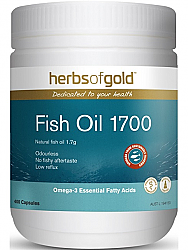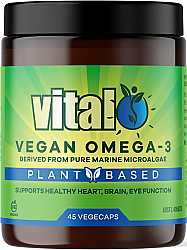Fish Oil Tablets & Capsules
-
Price 0
-
Brand 0
-
Category
- Fish Oil (6)
- Energy Supplements (70)
- Stress, Anxiety & Sleep (51)
- Digestive Health (51)
- Immune Boosters (50)
- Antioxidant Supplements (43)
- Arthritis & Joint Support (42)
- Heart Health (33)
- Womens Health (32)
- Cold and Flu (30)
- Detoxification (29)
- Minerals (28)
- Magnesium (25)
- Mens Health (25)
- Memory and Concentration (23)
- Bloating / Abdominal Fullness (23)
- Liver Health (23)
- Anti-Inflammatory Supplements (23)
- Bone Health (22)
- Male Support (21)
- Hair Skin and Nail Supplements (20)
- Cramps & Spasms (20)
- Nutra-Life Promo Products (19)
- Constipation (19)
- Spirulina, Greens & Reds (19)
- Skin Supplements (18)
- Antiviral Supplements (17)
- PMS Supplements (17)
- Libido Supplements (16)
- Multivitamin and Mineral (16)
- Irritable Bowel Syndrome (IBS) (16)
- Vitamins (15)
- Reflux Indigestion (14)
- Circulation Supplements (13)
- Flatuence (13)
- Sexual Health & Libido (13)
- Cold Sores (12)
- Liver Tonic (12)
- Probiotics (11)
- Allergy Supplements (11)
- Digestive Enzymes (10)
- Leg Circulation Vitamins (10)
- Superfood Powder (9)
- Co Enzyme Q10 Supplements (9)
- Alkalising Supplements (9)
- Vitamins for Circulation (9)
- UTI Supplements (9)
- Headaches (8)
- Barley Grass Powder (8)
- Vitamin C (8)
- Essential Fatty Acid (7)
- Coq10 (7)
- Curcumin Supplements (7)
- Sinusitis Supplements (7)
- Zinc (6)
- Blood Sugar Control (6)
- Vitamin B Complex (6)
- Calcium (6)
- Turmeric Supplements (5)
- Carbohydrates (5)
- Dermatitis Supplements (5)
- Kidney Health (5)
- Maxs Muscle Up Challenge 2018 (5)
- Menopause Supplements (5)
- Acne Supplements (5)
- Thyroid Supplements (5)
- Vitamin B12 (5)
- Eczema Supplements (5)
- Hay Fever Supplements (5)
- Chlorophyll Supplements (5)
- Omega 3 Fish Oil (5)
- Glucosamine Chondroitin (5)
- Milk Thistle (4)
- Prostate Health (4)
- MSM Supplements (4)
- Vitamin D (4)
- Varicose Veins Supplements (4)
- Organic Spirulina Powder (4)
- Motion Sickness Supplements (4)
- Hot Flashes (4)
- Fibre Supplements (4)
- Herbal Menopause Supplements (4)
- Bladder Supplements (4)
- Childrens Health (4)
- Hypothyroidism Supplements (4)
- Glucosamine Chondroitin & MSM (4)
- Health Supplements (4)
- Folate (3)
- Maxines Shape-Up Challenge 2018 (3)
- Fibre Powder (3)
- Cranberry Supplement (3)
- Eye Care (3)
- Soluble Fibre (3)
- Chromium (3)
- Chlorella Supplement (3)
- Breastfeeding Supplements (3)
- For Constipation (3)
- ZMA Supplements (3)
- Nausea Supplements (3)
- Odourless Fish Oil (3)
- MCT Oils (3)
- Insoluble Fibre (2)
- Mens Multivitamins (2)
- Vitamin B3 (2)
- Vitamin B6 (2)
- Diuretics (2)
- Herb of Gold (2)
- Blue Green Algae Spirluna (2)
- Iron (2)
- Green Tea Supplements (2)
- Biotin Supplements (2)
- Pregnancy Vitamins (2)
- Iodine (1)
- Vitamin E (1)
- Celery Supplements (1)
- Vitamin B5 (1)
- Bilberry Supplements (1)
- Vitamin B2 (1)
- Grape Seed Extract (1)
- Ubiquinol (1)
- Vitamin B1 (1)
- Chlorophyll Powder (1)
- Garlic, Horseradish & Vitamin C (1)
- Colostrum (1)
- Aged Garlic (1)
- Estrogen Blockers (1)
- Evening Primrose Oil (1)
- Horseradish Supplements (1)
- Nutra-Life (1)
- Selenium (1)
- Garlic And Horseradish (1)
- Potassium (1)
- Krill Oil (1)
- Show more [+]
About Fish Oil Tablets & Capsules
Fish oil Supplements are perhaps the most popular health products on the Australian market, available in capsule and liquid form. The importance of optimising your daily intake of omega 3 cannot be overstated for maintaining optimal heath wellbeing and assisting in the prevention of chronic disease.
Nutrients reported in 2016 that the Omega 6 to 3 ratio of the Western diet is currently around 20:1. This means for every gram of Omega 3, 20 grams of Omega 6 are consumed. An ideal ratio for human health is believed to be closer to 1:2, which is one part omega 3 and two parts omega 6. In fact, if you consume a typical western diet with a high Omega 6 content, it may be necessary to consume more Omega 3 than Omega 6 for a period of time to restablish balance. Then a more balanced dietary fatty acid intake between Omega 6 and 3 could adhered to.
The basic Omega 3 fatty acid is called Linolenic Acid, while the Omega 6 fatty acid is Linoleic Acid (an extra "n" can make all the difference). Both are referred to as essential fatty acids, which means our body cannot synthesize them and must take them in through diet or supplementation in order to maintain health. A large portion of our body is fat, such as the brain and every cell membrane. This outer membrane of the cell (cell membrane) or coating of each cell separates it from other cells and extracellular fluids, which is essential for maintaining communication as well as atom/molecule transfer into and out of the cell.
Once in the body, Linolenic Acid and Linoleic Acid can be converted by enzymatic reaction into other fats. In the case of Linolenic acid (Omega 3), a portion of the available fats are converted to EPA and DHA. These specialised fats play crucial roles in the body, such as warding off inflammation and supporting brain health. However, our body’s ability to convert Linolenic acid to EPA and DHA is limited. As little as one per cent of ingested Linolenic acid ends up as DHA, provided we are consuming enough in the first place! For this reason, it is a great idea for most to supplement with these Omega 3 fatty acids on a daily basis.
Fish oils are a cost-effective way to keep your daily intake of EPA and DHA optimised. They and are safe and suitable for dogs and other pets, as well as children. Krill oil is also a great option, containing the EPA and DHA in phospholipid form, which differs to the triglyceride form found in fish oil. The phospholipid form offers increased bioavailability over standard fish oil, which improves its delivery to the brain. Fish oil even has a triple strength now, allowing you to take one capsule instead of three, which is the best option for those who don't enjoy pill popping.
The authors of a literature review published in the Annals of the Rheumatic Diseases in 2018 undertook an exhaustive review of every single clinical trials since 1966. They concluded that there is a strong evidence base for the use fish oil supplements in the management of rheumatoid arthritis. They found a clinical and statistical correlation between supplementation and improvements in this form of inflammatory arthritis. Meta-analysis have also indicated that regular fish oil supplementation is associated with reduced all-cause mortality.







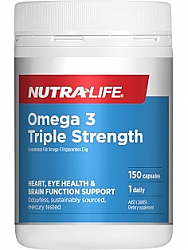
(2).png)

